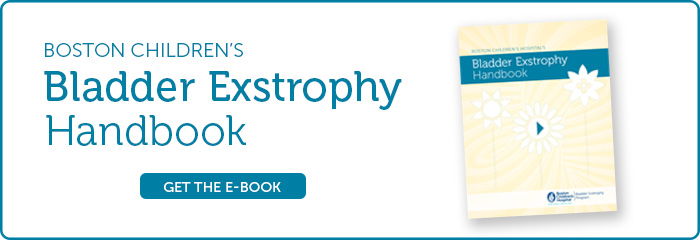The Boston Children's Hospital Bladder Exstrophy Program specializes in the care of children with bladder exstrophy, a rare and complex birth defect in which the bladder is turned "inside out." As an established and dedicated program within the Department of Urology, our team has decades of experience performing surgeries and managing the care of patients with bladder exstrophy. In addition to our Urology team, care of children with bladder exstrophy is supported by experts in Anesthesiology, Gynecology, the Maternal Fetal Care, Orthopedics, Physical Therapy, Radiology, and Urodynamics.
Our bladder exstrophy team is here when you need us
If your child has bladder exstrophy, or if there is a suspected diagnosis, our clinicians provide the latest innovative treatments, but our care goes beyond that. Before your baby is born our team will discuss your options and answer any questions. We also provide psychosocial and emotional support for you and your child as you cope with the challenges of this condition to ensure you are informed at every stage.
Once your child is born, surgery is delayed six to eight weeks to allow for growth and development, and time for you and your baby to bond. After the first surgical repair, we closely monitor your child's development, growth, and overall health, with particular attention to bladder and kidney function.
Initial surgical reconstruction of bladder exstrophy is, perhaps, the most critical step in your child’s care. There are varied approaches for both technique and timing for this initial surgery. At Boston Children’s, our preference is to repair your child’s exstrophy in a single operation that combines closure of both the bladder and urethra at the initial surgery. Learn more about our innovative treatments and research.
Psychosocial support for bladder exstrophy
Psychosocial support is a critical component of the Bladder Exstrophy Program. Our team partners with children and their families along the continuum of care to ensure your needs are met. These needs may focus on care coordination, coping, orientation with hospital services, identification of community programs, or support with school transitions. We work closely with hospital-wide programs including the Hale Center for Families, Child Life Specialists, Department of Spiritual Care (chaplaincy), and Child Psychiatry and Case Management.
Our Exstrophy Support Group meets twice a year for a half day and offers patients and their families an opportunity to meet and learn from one another. A typical group may include a presentation, a patient or family panel, and break-out sessions, while children have their own program. In addition, our Family-to-Family Program is available to introduce new patients and their families to experienced family partners.

Lifting the fog on bladder exstrophy
“We knew Dr. Borer wasn’t going to stop until he figured out what was going on. He was so focused on making things right.”
Multi-Institutional Bladder Exstrophy Consortium
The Multi-Institutional Bladder Exstrophy Consortium (MIBEC) was created in February 2013 to facilitate collaboration among experts dedicated to the care of patients in the exstrophy-epispadias spectrum of anomalies. The focus of MIBEC is to refine the surgical technique "complete primary repair of bladder exstrophy (CPRE)," to standardize subsequent care, and to optimize functional and cosmetic outcomes. Three world-renowned institutions — Boston Children’s, Children’s Hospital of Wisconsin, and Children’s Hospital of Philadelphia — gather together to address these common goals by sharing surgical expertise and personal practices to create evidence-based solutions for current and future patients.
Each month, pediatric urologists from these three institutions diligently review indicated patients, develop the plan, and travel to the host hospital to collaborate in the operating room — in real-time — ultimately to benefit patient care. Details of all operations are recorded in both high-definition video and handwritten form to allow for reflective analysis and important insight into every surgery and patient. The detailed follow-up protocol helps the team evaluate all aspects of short- and long-term results of surgery, including kidney and bladder function, urinary continence, and quality of life.
The invaluable information collected during these experiences is part of our pioneering innovation and research.



